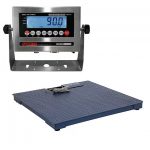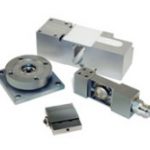The recycling industry plays a vital role in preserving our environment and conserving valuable resources. Among the various sectors of recycling, metal recycling stands out as a key player in reducing the strain on our planet’s natural resources. However, in the quest for a more sustainable future, it’s not just about collecting scrap metals; it’s also about ensuring that the process is transparent, efficient, and fair.
A critical aspect of this process is the accurate weighing of scrap metal and in some cases the trucks hauling the metal. In this article, we will look at the scales used at recycling centers and explore the significance of accurately weighing customers scrap metal that they are looking to sell.

The Metal Recycling Industry: An Overview
Metal recycling is a multifaceted industry that involves the collection, processing, and transformation of various metals, including steel, aluminum, copper, and more. The process starts with the collection of scrap metal from various sources, such as households, construction sites, and industrial facilities. Once collected, the scrap metal is sorted, processed, and then melted down to create new products.
The recycling of metals has numerous environmental benefits. Firstly, it conserves natural resources, as metals are finite and non-renewable. Secondly, it reduces energy consumption. For example, recycling aluminum consumes significantly less energy compared to producing it from raw materials.
The Role of Weighing in Metal Recycling
Weighing plays a pivotal role in the metal recycling industry, particularly when it comes to determining the compensation for individuals or companies delivering scrap metal. Accurate weighing ensures fairness and transparency in the payment process, which is essential for building trust among customers and maintaining the integrity of the industry.
Popular scales utilized in the metal recycling industry include truck scales, which are usually 70′ long and can weigh up to 100,000 pounds and industrial floor scales which are typically 4’x4′ or 5’x5′ in size and can often hold anywhere from 1000 lbs up to 10,000 pounds. We even have the popular LP7620 4×4 20,000 lb floor scale for metal recycling.
-
Fair Compensation: Accurate weighing allows recyclers to pay customers the going rate for their scrap metal. When the weight of the delivered material is measured precisely, customers receive payment that reflects the actual value of their contribution. This encourages more individuals and businesses to participate in recycling, thus increasing the overall supply of scrap metal.
-
Legal Compliance: Many countries and regions have strict regulations governing the trade of scrap metal. Accurate weighing on legal for trade scales helps recycling companies and consumers. Ideally the scales weigh correctly and the weight of the goods is a large determinate of the payment the consumer receives.
-
Environmental Impact: Accurate weighing contributes to the overall efficiency of the recycling process. When recycling facilities can precisely measure the weight of incoming materials, they can optimize their operations, ensuring that materials are processed efficiently and waste is minimized. This, in turn, reduces the environmental footprint of the recycling industry.
- Data Management: Weighing systems often integrate with data management software, providing recyclers with valuable insights into their operations. This data can be used to track incoming materials, monitor recycling rates, and optimize logistics, ultimately leading to more efficient and sustainable practices.
Role of Technology in Accurate Weighing
Accurate legal for trade weighing in the metal recycling industry relies heavily on precision weighing equipment. Traditionally, older style weighing scales were used, but they have been largely replaced by more sophisticated solutions. Here are some key technologies used for accurate weighing in metal recycling:
-
Truck Scales: Weighbridge scales, better known as truck scales, are large platforms designed to weigh entire vehicles, including the truck and its cargo. These scales are highly accurate and can handle heavy loads, making them ideal for weighing trucks delivering scrap metal to recycling facilities. Typically a fully loaded truck drives across the scale and a weight is obtained. The scrap metal is then offloaded. Then the truck drives back over the scale. At that point, the gross, tare, and net weights are determined.
-
Digital Load Cells: Load cells are essential components of weighing systems. They are sensors that measure the force exerted by a load, such as a truck or its cargo. Load cells are highly sensitive and can provide precise weight measurements. These have been traditionally analog for many years. However, today it is more common to see hydraulic or digital load cells in more locations.
-
Software Integration: Modern weighing systems often integrate with software that allows for real-time data collection and analysis. This software can generate reports, track inventory, and even automate payment processes, streamlining operations for recycling facilities.
-
Remote Monitoring: Some weighing systems (often with digital load cells) offer remote monitoring capabilities, allowing recycling facility operators to access weight data and scale diagnostics from anywhere. This can enhance operational efficiency and minimize downtime.
-
RFID and Barcode Technology: To ensure accurate tracking and data management, some facilities use RFID (Radio-Frequency Identification) or barcode technology to link weight measurements with specific loads of scrap metal. This helps prevent errors and ensures accurate record-keeping.

Final Thoughts on Scales used at Recycling Centers
Accurate weighing is not just a technicality in the metal recycling industry; it is a fundamental element that both parties expect in order to achieve fairness, transparency, and sustainability. It ensures that customers are compensated fairly for their contributions, helps recycling facilities comply with regulations, minimizes environmental impact, and optimizes operations.
As technology continues to advance, the accuracy and efficiency of industrial scales used at recycling centers will only improve. If you need some assistance choosing scales for your scrap yard be sure to contact our customer service department.